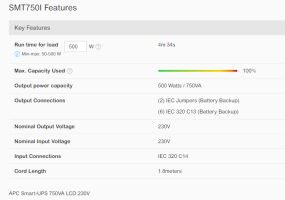ismail gul
New member
- Joined
- Feb 25, 2022
- Messages
- 4
I am planning to replace my APC smart-UPS 750vA battery with lithium ion batteries (18650). right now it has lead acid battery 2x 7ah each connected in series.
i have built a 7s10p battery pack i have bms 24v 25A rated ordered from aliexpress. my question is will it work for my project ? can this bms provide enough power for my project?? please help
bms link is here

 www.aliexpress.com
www.aliexpress.com
i have built a 7s10p battery pack i have bms 24v 25A rated ordered from aliexpress. my question is will it work for my project ? can this bms provide enough power for my project?? please help
bms link is here

2.99US $ 68% OFF|Balanced Bms 7s 24v 15a 20a 25a Lithium 18650 Battery Charge Board Equalizer With Ntc Temperature Protection For Ebike/escooter - Battery Accessories & Charger Accessories - AliExpress
Smarter Shopping, Better Living! Aliexpress.com



